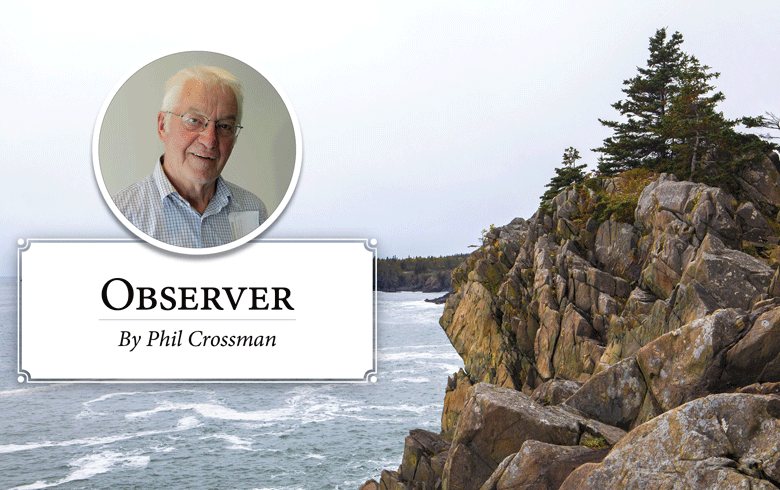Away happens and it comes in many forms as does the process of making an accurate determination of whether one is from here, from here only to a degree, or from elsewhere.
The means-testing that has emerged is quite sophisticated and, when applied carefully, reveals relative nativeness with uncanny accuracy. I was born in Massachusetts resulting in an automatic ten-point deficit. Fortunately, however, my ancestors on my mother’s side are all from Vinalhaven and their lineage extends way back to 1760 when my grandfather Reuben Carver arrived here, bought most of the land around “Carver’s” Harbor, and went into business.
The fact that eight successive generations—each accumulating more points for having resisted the temptation to breed elsewhere—remained rooted, resulted in that deficit being replaced by a 97-point surplus. Still, contamination was unavoidable and in the late 1700s a woman from Matinicus had her way, as those women will, with a grandfather from the next generation and the compromise of our pure island bloodline began.
I then had the bad form to marry someone from Away myself and, while she wasn’t from Massachusetts…
Although my ancestors resisted traveling abroad to find suitable companions, and did so successfully for 200 years, subsequent generations did succumb to the sporadic enticements offered by men and women from elsewhere.
The prevailing formula calls for a few points to be subtracted each time a family member partners with someone who’s come from Away. The exact size of the deficit depends on exactly which part of Away the usurper comes from, and in some cases, the motives. Massachusetts, for example, and a compelling desire not to be there, are the most suspect and given the least credence.
I then had the bad form to marry someone from Away myself and, while she wasn’t from Massachusetts, she had once lived there and coming on top of having been born there myself, and the fact that my mother married a man from Massachusetts—well, it wasn’t good.
Ultimately, I did manage a surplus of 73 points. A good deal more than many, but way down the pecking order.
There is an appeals process and I pursued it for a while, but my accumulated good works and long island lineage were not enough to overcome the repeated Massachusetts deficit and that, coupled with the likelihood that I would be assessed a couple more points for being a nuisance, I opted to be content with my 73 points.
The issue of Nativeness is a consuming one but it’s actually a component of our community baggage and a telling distinction between us here and others elsewhere. It’s our body of common knowledge. It grows continually but not as fast as one might expect because as new information is added, older memories are forgotten or the people who remember them pass on.
We are compelled, particularly during the off-season, to consider ourselves in the context of 1,264 others with whom we share this island. Everyone who’s been here as long as I have, for example, remembers me as a kid. Actually, they all remember more than I do and with un-nerving specificity.
On the other hand, I know all about them and about their kids and ancestors. The result is that the discriminating among us don’t laugh too hard at the expense of others of us.
Phil Crossman continues to live on Vinalhaven, as he has for most of his life.





